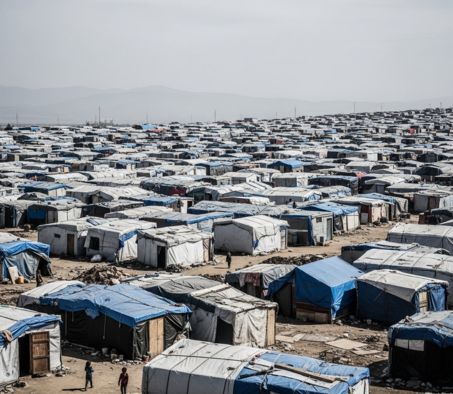As experts in refugee law, Topmarké Attorneys understand the complexity and sensitivity that are involved in refugee cases. We handle appeals and judicial review challenges against refusals of all types of immigration and refugee protection applications at the Appeal Division of Immigration and Refugee Board, the Federal Court, Federal Court of Appeal, and Supreme Court. It is our mission to ensure that these matters are managed with tact, caution, and precision.
What can we help you with?
- Making a Claim for Refugee Protection (RPD)
- Refugee Appeal Division (RAD)
- Federal Court (FC)
- FAQs Regarding Refugee Protection.
Making A Claim For Refugee Protection
The Refugee Protection Division (RPD) of the Immigration and Refugee Board of Canada (IRB) has the duty to determine your need for protection in Canada. once you make your claim for refugee protection from within Canada. You have to ensure that you make your first claim for this and if you are eligible, you will be referred to RPD for determination.
When you get to the referral stage at the RPD, a decision-make (also known as a “member”) at RPD will consider information that you provided with and your testimony at a hearing and other related proof to decide your qualification for refugee protection.
Getting your claim referred
Generally, this process begins as soon as you speak to an officer at any port of entry when you arrive at the Canadian border or at an inland office after you have entered Canada. You must ensure to speak with an officer from either Canada Border Services Agency (CBSA) or Immigration Refugees and Citizenship Canada (IRCC). Then they will assess your eligibility to be referred or sent to RPD for determination.
The referring officer will provide you with a Confirmation of Referral that indicates that your claim was referred for determination if your claim for refugee is referred to the RPD. The referring officer will also provide you with a copy of Important Instructions for Refugee Claimants as well as the Claimant’s Guide. These three documents help you to understand essential information related to your claim. It is crucial for you to review this information thoroughly.
RPD will then send you a Notice to Appear (NTA) later for a hearing that will inform you the date and time of your claim hearing. You MUST notify the IRB and IRCC and/or the CBSA of the changes in writing if your contact information changes. This is important because your claim may be declared abandoned if the RPD is unable to reach you. This abandonment status will prevent you from continuing with your claim or making any other claims in the future.
Submitting document to support your claim
Please ensure that you submit all the required documentation and provide everything that has been requested to avoid any unnecessary delays.
Basis of Claim Form
This Basis of Claim Form (BOC) is required for any refugee protection claimant. You will present your claim in details about who you are and why you are seeking protection in Canada on your BOC. The RPD member will consider the information provided in your BOC form when deciding your claim along with your testimony at the hearing to come to a decision on your claim. The member may ask you enquiries about anything you have included or not included on the BOC form.
- You must provide your completed BOC form to the RPD no later than 15 days after the date your claim was referred if you made your claim at a port of entry and it was deemed eligible and referred.
- You would be required to submit the completed BOC form to the officer before the eligibility of your claims was assess if you made your claim at an inland office.
The RPD may declare that your claim has been abandoned if you fail to meet your deadline for your submission of completed BOC form. In other words, your claim will NOT be heard if it has been abandoned. The RPD will hold a special hearing for abandonment no later than five days after your BOC form was due before formally declaring your claim abandoned. You will have to explain the reason for not being able to provide a completed BOC form on time and why the RPD should still continue with your claim. You will see the date for your special hearing under the section called “Special Hearing date if the Basis of Claim Form is not received on time” of the Confirmation of Referral.
Relevant proof
You should also submit other documents to support your claim in addition to your BOC form when possible. This could be your identity documents, evidence of human rights conditions in your country or any other relevant proof. You should send the copies of these additional documents and your list of witnesses (only if you are planning to have any) at least 10 days before your hearing to the RPD. Please note that it is best for you to send your documents instantly to the RPD after obtaining them.
If you have any questions about these supporting documents, TPM attorneys can help you clarify these in details so that you would be ready for your hearing.
Attending your hearing
Your hearing takes half a day usually and it will be held in private so that we can protect you and your family along with your family. There is usually a short break halfway through the hearing.
The RPD will send you an NTA for a hearing by physical mail when your claim is ready for a hearing. There are two dates on the NTA:
- The first date will be your date of hearing. NTA will inform you the location, date and time of your hearing along with the time you must arrive for the hearing. You must attend your hearing on the date given unless the RPD tells you to do otherwise. It is important to remember that only the RPD can change the date or time of your hearing and this will only take place under very rare circumstances.
- The second date will be for your special hearing. You must appear at your special hearing to explain your reason for your inability to attend your hearing and why the RPD should not consider the abandonment of your claim.
Please note that the projected wait time for claims for refugee protection before the RPD is approximately 22 months from the date of referral as of January 1st, 2020. Also, please be advised that the RPD mainly schedules hearing in the order of receiving dates of claims but it also balances this approach with the prioritization of a few claims to achieve case efficiencies and to ensure program integrity.
Refugee Appeal Division (RAD)
If you disagree with a negative decision of your refugee claim and want to appeal your application is submitted to the Refugee Appeal Division (RAD). If you meet the specific requirements and conditions you will need to file an appeal.
To start your appeal:
- Meet with your counsel to determine the bases of your appeal and find out if you meet the requirements to go ahead.
- You must file a Notice of Appeal to the RAD no later than 15 days after the day on which you receive your Notice of RPD decision.
Once your appeal has been filed, you must submit all required documents and information (ensure you discuss with your counsel on the documents to be provided).
The Refugee Appeal Division (RAD) can either make its decision without a hearing, based on the submission and evidence provided or in certain situation an oral hearing may be convened. In certain cases, the RAD may allow you to provide new evidence that the RPD did not have when it reached its decision. If there is to be an oral hearing, you, your counsel and the Minister will receive a notice to appear for a hearing.
If at any point, the Minister decides to oppose your appeal or raise an issue, you will receive a notice of intervention along with the evidence being provided by the Minister. You will have 15 days to respond to this communication.
When a decision has been reached on your refugee appeal, the RAD will send a written Notice of Decision with the explanation of the reasons for the decision.
Three outcomes may result from your appeal:
-
Appeal is allowed
This decision means the RAD has approved the appeal and accepted clients as Conventional Refugees. With this decision applicants can proceed to apply for Permanent residence.
-
Appeal is rejected: RPD decision is confirmed
You may choose to further appeal this decision at the Federal Court.
-
Refer (send) the case back to the RPD and order a new hearing, giving the RPD the directions that it considers appropriate.
This means the matter is remitted back to another department of the refugee panel for reconsideration.
Federal Court (FC)
- Judicial Review – grounds for judicial review are vast but it also has its limits. You may request the Federal Court to review any claim with an administrative decision i.e. immigration decisions or non-immigration decisions. Such cases range from PRRA application, H&C, Refugee, and many others. If the Immigration and Refugee Board (IRB) rejects your claim for refugee protection, you must file an application for a Federal Court review within 15 days of the IRB decision. This takes place in 2-stages
- Leave for an appeal – at this stage, the court reviews documents about your claim to prove that the decision was unfair, reasonable or if there was an error. If the leave is approved, then the Federal court agrees to examine the decision in depth.
- Judicial Review – At this stage, your lawyer can attend an oral hearing before the court and explain why you believe the original decision was wrong. You can choose to either attend the hearing with your lawyer or not.
FAQs Regarding Refugee Protection.
Will an interpreter be provided for me?
Yes, the RPD will provide you with an interpreter at your hearing at no cost. You must indicate the language and dialect you would like to use in the “Language and Interpreter” section of your BOC form. The RPD will provide interpretation between the language and the dialect your select and the official language of Canada (English or French) you choose in the same section of your BOC form.
Do my children need to come to the hearing?
Your children must attend the hearing if they are also claiming refugee protection and are 12 years or older. However, young children under the age of 12 who are accompanied by an adult making a refugee protection claim will not be required to attend the hearing unless the presiding member requires their attendance. When a member decides whether it is essential for a young claimant to attend the hearing, the claimant and their designated representative (DR) will be notified as soon as possible so that families can make the necessary arrangements.
Can I bring witnesses?
You may do so if you believe that this will help you with your claim. A definition of witness here is a person who know about your claim and can provide information that will help a member make a decision. Witnesses must be prepared to answer any questions regarding the information they provide you at the hearing—this is known as giving testimony.
I understand that the RPD also schedules short hearings and there is an expedited process. How can I be included in those?
You cannot be request to have a short hearing or to be included in the expedited process yourself. The RPD ultimately makes the decision on the length of hearing or the types of each claim based on the details in the file. Please note that every case is assessed on its own merits. We can confirm that there is an expedited process but this is more so for straightforward cases rather than complex ones and the RPD will be the entity making the decision on claim expedition and a short hearing.






